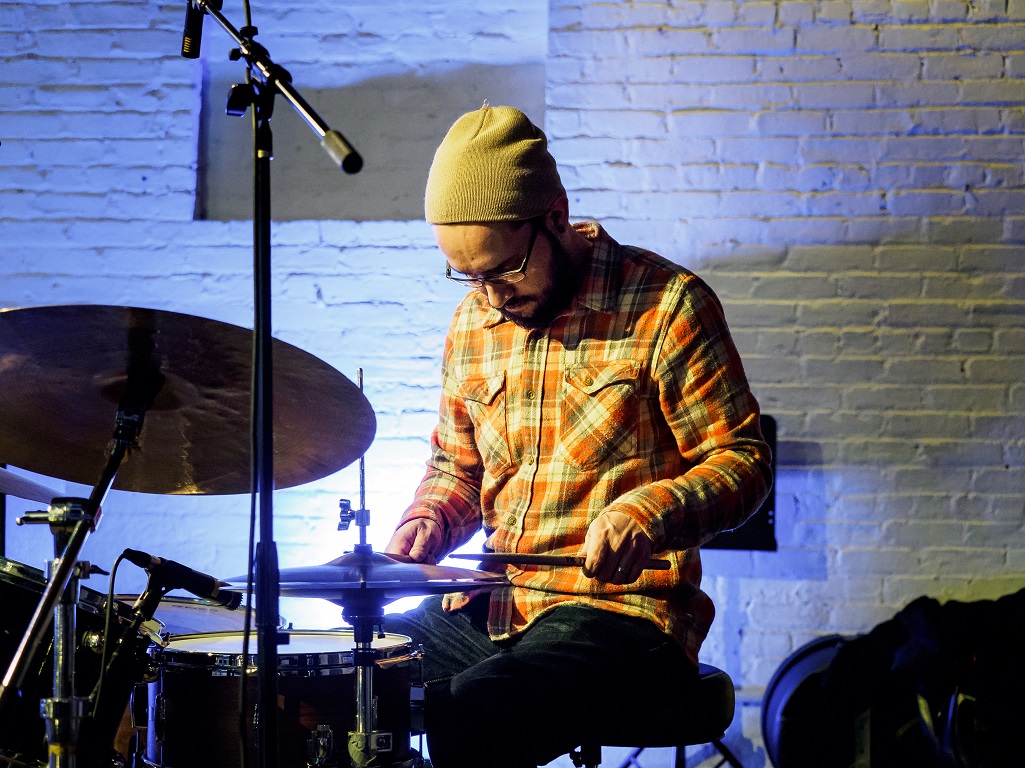Richmond-based musician Scott Clark believes in telling stories with his music. His new album, “This Darkness” — coming this month from Richmond label Out Of Your Head Records — is a meditative piece inspired by a Rainer Maria Rilke poem.
Scott Clark has a lighthearted way of speaking about his chosen medium. His voice is filled with care for his instruments and inspirations, as well as understanding of the uneasiness newer listeners may have.
Calling This Darkness — his upcoming album, set to be released on January 15 — a solo drum set record wouldn’t be false, but it doesn’t quite capture the dynamic, meditative work he puts forward. For Clark, his solo recording was an opportunity to tell stories through his work.
“The idea of trying to storytell … trying to touch on certain subjects, trying to figure out ways to convey meaning and imagery with a storyline … that’s always been more important to me than just sitting down and playing for no reason,” Clark said. “I have an easier time connecting to something, and portraying that to the listener.”
While This Darkness does center around Clark’s drumming, it does not actually feature any drums for the first seven minutes. Instead, Clark uses the harmonica to explore a sonic field — playing long notes, making space for the thoughtful, 45-minute piece to come.
This Darkness was primarily inspired by the poem “Let This Darkness Be a Bell Tower,” written by the Bohemian-Austrian poet Rainer Maria Rilke, translated by Joanna Macy. One of Clark’s friends recommended that he listen to a podcast on which Macy had given an interview, and Clark heard her recite the poem on the episode. Before he went into the studio to record This Darkness, he kept the poem in his bag, pulling it out and re-reading it several times a day.
“It really resonated with me,” Clark said. “It’s so succinct… when I went to go record, it was put down on the music stand that I had set up in the studio, and I decided that I would start playing to this poem.”

The poem, like the album, is a thought-provoking call to mystery and tranquility. The first lines read, “Quiet friend who has come so far / / feel how your breathing makes more space around you.” The space between the lines resonates in the quiet sounds of Clark’s playing throughout the piece.
Drawn to experiments with sounds, Clark describes his background in music and percussion as one of learning and exploration of personal identity. He talks about a teacher who instructed him to start the day with a bit of improvisation, and end it with something completely different — something he wouldn’t normally think to practice.
“I used to scrape a fork on my cymbal for 30 minutes, just dumb things like that,” Clark said. “I think you don’t realize what it’s doing for you until years later when you’re like, ‘Oh I have the patience to sit here and scrape this cymbal for a lot longer than you might want to listen to it.’”
That patience is a quality well transferred into This Darkness, which has a natural, gravitational pull to it. There’s a feeling of vast, open darkness in the harmonica loops, and an intimacy in Clark’s use of percussion — a sonic voyage of internal discovery.
Before the pandemic, Clark used to do solo performances at local venues and gallery spaces. He spoke about wanting to avoid the “drumnastics” which are somewhat typical of solo drum performances, and instead focus on listener engagement and connection.
“I realized that because people are there, and it’s a listening environment, you could hit a cymbal, and you could not do anything else until the symbol was done ringing completely,” Clark said. “You could really try to bring everybody into that space. For me musically, that’s the biggest thing I’m after — connection to a listener, no matter how big or small it might be.”
Using Macy’s translation of the Rilke poem as a catalyst, Clark composed and recorded This Darkness in one sitting. He then went back and divided the record into songs, naming each song after lines in the poem in order to convey some of the meaning he had gleaned from the words.
“I was really trying to get into the space, and once you’re there you want to ride the wave, like you would if you were performing,” Clark said. “It felt natural to just go, because the momentum had been built, and record the piece.”
Traversing an exploratory, experimental arc in under an hour, This Darkness brings a quiet peace to listeners. It’s raw, restrained, and unique — even in its own subgenre. Clark is looking forward to the album’s release, and hopes to be able to play it for an audience someday. In the meantime, listeners will have to journey inward.
“I hope it can shine light, and maybe give peace and space to someone who might need it,” Clark said. “You never know when your work is going to be needed by someone, so you just kind of have to keep making and keep creating.”
This Darkness will be released on January 15 by Out Of Your Head Records, a collaboration between Clark and fellow Richmond musician and composer Adam Hopkins. It can be pre-ordered on vinyl and digital formats from Out Of Your Head’s Bandcamp page.
Top Photo by Peter Gannushkin, courtesy Out Of Your Head Records.



